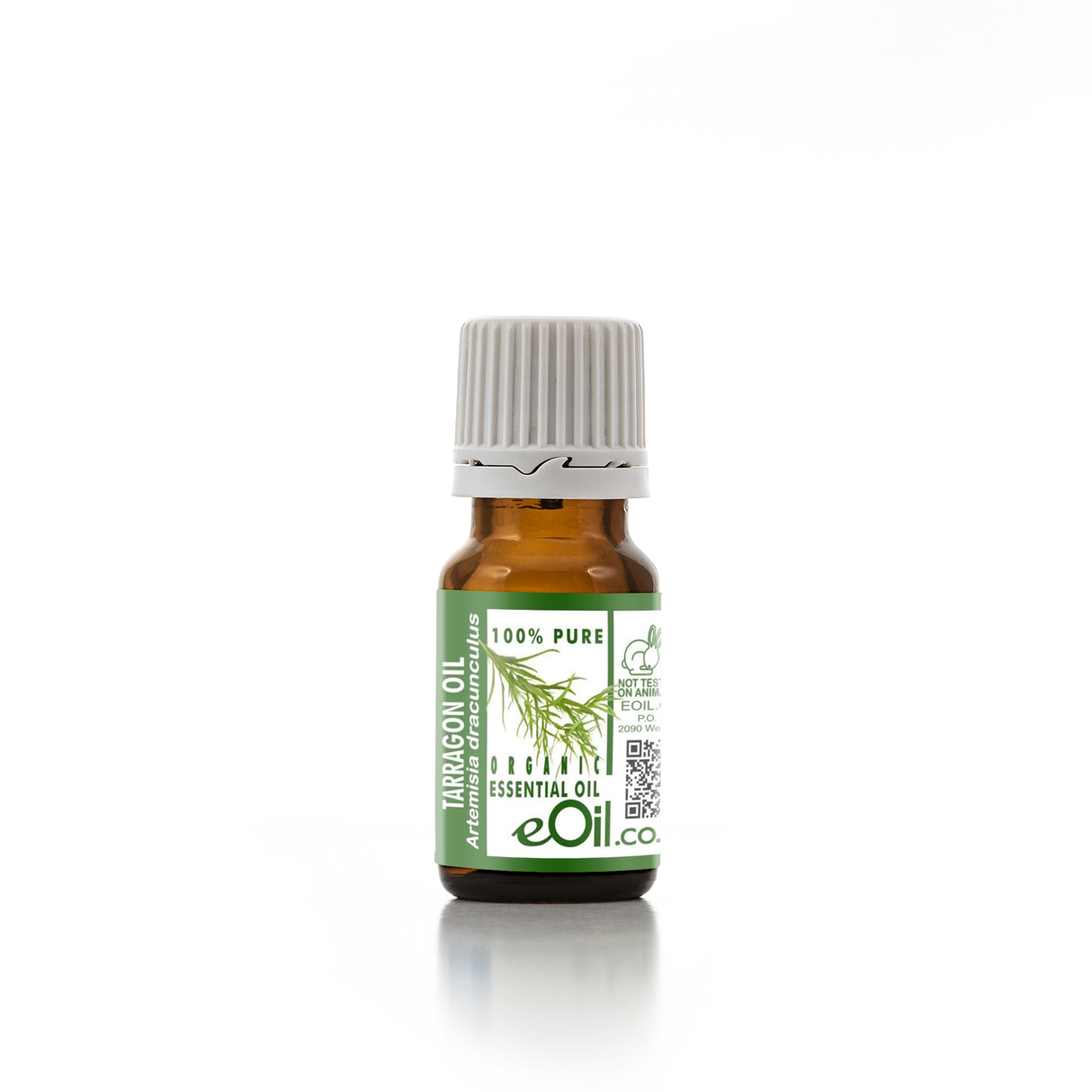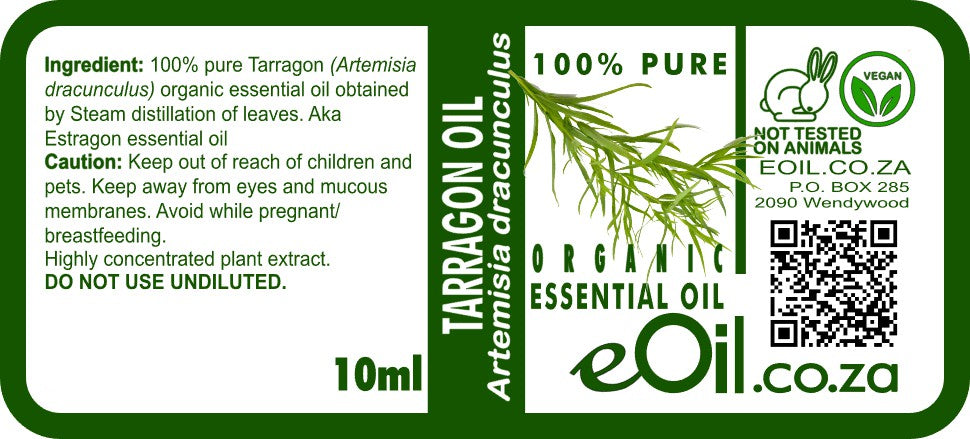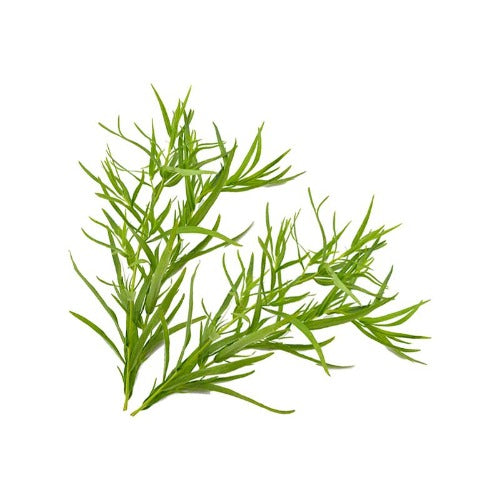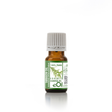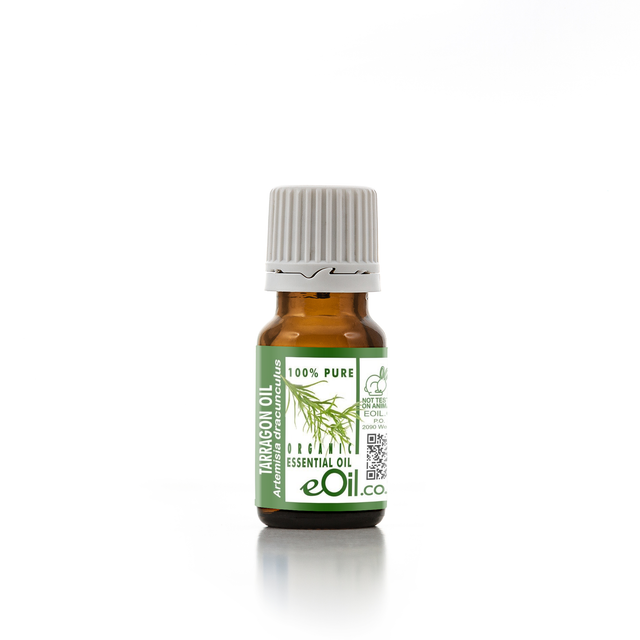Tarragon Organic Essential Oil
Tarragon Organic Essential Oil - 10 ML is backordered and will ship as soon as it is back in stock.
Description
Description
Tarragon organic essential oil, steam distilled from the leaves of Artemisia dracunculus, brings a sweet, herbaceous, slightly spicy aroma with powerful support for digestion, muscle relaxation, and stress relief.
Prized in natural wellness and perfumery, this oil is cherished for both its aromatic elegance and its renowned digestive-calming action.
IDENTIFICATION
TARRAGON OIL
Essential oil
Artemisia dracunculus
SOFT MUSCLES CRAMPS, TIGHT MUSCLES CONTRACTURES AND CRAMPS, PMS AND PERIOD CRAMPS, DIGESTION RELATED DISCOMFORTS, STOMACH BLOATING, MOTION SICKNESS, HAY FEVER AND ALLERGIES. BODY APPLICATION, BATHS, ULTRASONIC & STEAM DIFFUSION, INHALATION, COOKING, NATURAL PERFUMES.
IDENTIFICATION
INCI name: Artemisia dracunculus (Tarragon) oil
CAS number:8016-88-4
SKU code: PEO1155
EXTRACTION METHOD: Steam distillation
PARTS USED: Leaves
ORIGIN: France
COMMON NAMES: Estragon, Dragon herb.
APPEARANCE: Pale yellow to green liquid.
ODOUR NOTE: Middle note. Sweet, anise-like green herbal, slightly spicy.
QUALITY: 100 % pure and natural whole essential oil.
STORAGE CONDITION: Tightly closed, in a dry, cool area, away from light.
INFOS AND INTERESTING FACTS
Chefs love tarragon essential oil to create aromatized oils and special condiments. It is a precious ally for all ladies who are affected by monthly cramps and pains. Tarragon, the little dragon, is also a powerful comfort for any digestion-related cramps and bloating, and a relief for people prone to motion sickness. Antispasmodic, Anti-allergic and digestive, Tarragon inhalations have traditionally been used to calm Hay Fever and Asthma spasms.
REPORTED BENEFITS & PROPERTIES
- Antispasmodic: ++++
- Aperitive, Digestive, Carminative, Stomachic +++
- Antihistaminic Anti-allergic +++
- Prevent fermentation and gas accumulations: +++
- Anti- inflammatory +++
- Uplifting: +++
- anti-viral: ++
- anti-fungal: ++
TRADITIONALLY USED FOR
- digestive related spasms and discomforts: Aerophagia, dyspepsia, flatulence, colitis, abdominal congestions, bloating, hiccups…
- allergic asthma. Allergies (soothing and calming the immune system from overreacting). Hay fever
- Muscular cramps and spasms
- Period pains. Period cramps, PMS.
- Nervous Tic and spasms
- Nausea due to motion sickness
INSTRUCTION OF USE
Fantastic for this use +++
Acceptable (suitable) for this use ++
Tolerable (not great for this use) +
Wellbeing comfort massages & body care
- Body massages use 1 to 6 drops essential oil for 10 ml carrier oil (0.5 to 2 % concentration) +++
- mix 1 drop of Tarragon essential oil in 4 drops carrier oil. apply on the solar plexus and bloated stomach… massage and repeat every 15 min until better.
- For PMS and period pains: start applying the oil mixed as suggested 2-3 days before the start of your periods. To help ease cramps, use a heat packs to relax the area, massage the oils on your lower back and lower abdomen, in circular motions. Repeat 2-3 times a day, and before bedtime when needed.
- Bath: first mix 10 to 15 drops of essential oil with 20 ml vegetable glycerine or 1 cup of Epsom salts ++
Diffusion
- Ultrasonic Diffusers for air purification, use 10 min 3 times a day. +++
- Inhalation: apply a few drops neat on a tissue and breathe when needed; or mix with a carrier oil and apply on your inner wrist. Inhale.
Others
- AROMATIZE YOUR DISHES +++:
- Note: dip just the tip of a toothpick in the essential oil and use that to mix into your finished sauce, cream, soup…If you are new to essential oils used as aroma in cooking, start by mixing just a drop of an essence, into 4 Tablespoons of a vegetable oil or butter that you will use as dip for breads, on salads or as a finishing touch. Then try aromatizing honey or sirup.
- Essential oils are best mixed beforehand into an appropriate support (buttery, oily, or syrupy. Alcohol, Vinegars, Salt, Sugar…Not watery) that you will then use to incorporate at the end of your preparations.
- Tarragon, like most ‘herbal’ essential oils, is great infused into a vegetable oil to brings a powerful tarragon-anise aroma to your vegetable or meat dishes.
- IN PERFUMERY: +++ As a middle note. Fresh, herbal, soft anise touch. Used in many ‘eau fraiche’ herbal fragrance for men;
For more detailed information, please go check this LINK TO Instructions of use essential oils page
DO NOT USE UNDILUTED and SEEK MEDICAL AND SPECIALIST ADVISE WHEN IN DOUBT.
SEE OUR PAGE ON PRECAUTION - HOW TO USE ESSENTIAL OILS SAFELY
SOME RECIPES | SYNERGIES
Tarragon essential oil is known for its antispasmodic, digestive, and sedative properties. It should be noted that this oil should always be used with caution, as it can be toxic and irritating if used improperly. It should never be ingested and should always be diluted before use. It's always recommended to do a patch test before applying it to the skin to ensure there's no skin irritation. Here are five recipes using Tarragon essential oil:
1. Relaxing Diffuser Blend:
- 2 drops of Tarragon essential oil
- 3 drops of Lavender essential oil
- 2 drops of Lemon essential oil
Add these oils to your diffuser according to the manufacturer's instructions. This blend can help promote relaxation and improve mood.
2. Soothing Massage Oil:
- 2 tablespoons of Sweet Almond oil
- 2 drops of Tarragon essential oil
- 3 drops of Lavender essential oil
- 3 drops of Chamomile essential oil
Combine the oils in a glass bottle. Use this blend for a soothing massage, particularly for areas of discomfort or tension.
3. Refreshing Bath Soak:
- 1 cup of Epsom salts
- 2 drops of Tarragon essential oil
- 3 drops of Peppermint essential oil
- 3 drops of Lavender essential oil
Combine ingredients and store in a glass jar. Use 1/4 to 1/2 cup of the mixture in a warm bath for a refreshing and relaxing soak.
4. Calming Room Spray:
- 1 cup of distilled water
- 5 drops of Tarragon essential oil
- 5 drops of Lavender essential oil
- 5 drops of Bergamot essential oil
Combine all the ingredients in a spray bottle. Shake well before each use and lightly mist the room for a calming and refreshing scent.
5. Aromatic Pillow Spray:
- 1/2 cup of distilled water
- 4 drops of Tarragon essential oil
- 4 drops of Chamomile essential oil
- 4 drops of Lavender essential oil
Combine all the ingredients in a spray bottle. Spritz lightly on your pillow before bedtime for a restful night's sleep.
Remember, if you're pregnant, nursing, or have any health concerns, it's always a good idea to consult with a healthcare provider before using essential oils.
Tarragon essential oil, like many others, is very potent and should be used in cooking very sparingly, if at all. In fact, it's generally recommended to use the fresh or dried herb instead of the oil for culinary purposes because of the oil's potency.
However, if you choose to use the oil, use it very sparingly. One drop of essential oil can be equivalent to more than a teaspoon of the dried or fresh herb. It's also important to ensure that the oil is of high quality and labeled as food grade. Here are a couple of recipes where you might use a tiny amount of tarragon essential oil:
1. Tarragon-Infused Olive Oil:
- 1 cup of olive oil
- 1 drop of Tarragon essential oil
Combine the oils in a glass bottle, shake well, and let it sit for a day to let the flavors meld together. Use this oil sparingly in salad dressings or drizzled over vegetables.
2. Tarragon Lemon Vinaigrette:
- 1/2 cup of olive oil
- 1/4 cup of fresh lemon juice
- 1 drop of Tarragon essential oil
- Salt and pepper to taste
Whisk together the lemon juice, tarragon oil, salt, and pepper. Slowly drizzle in the olive oil while continuously whisking to emulsify the dressing.
Use this vinaigrette sparingly on salads or as a marinade.
Remember, essential oils are very concentrated, so a little goes a long way, especially when cooking.
Always start with less, as you can add more if needed. And always ensure the essential oil you're using is safe for consumption and of a high quality.
Please note that not everyone agrees on the safety of ingesting essential oils, even those labeled as food grade.
Always consult with a healthcare professional before using essential oils in cooking.
BLENDS WELL WITH
- Period pains, spasms and cramps, PMS: With Basil or Clary sage essential oils in a carrier oil (Evening primrose Oil)
- Allergic or nervous Asthma, Hay fever: with Marjoram, Roman Chamomile, in Black cumin seed oil (Nigella)or Tamanu oil (Calophylla inophyllum)
- Nausea from motion sickness: with lemon, peppermint essential oils
- Hiccups: With Cardamom or French Lavender essential oils.
- Perfumes: with sage & lavender, with vetiver, ginger and black pepper, with Lemon, Bergamot, Cardamom, Rosewood, Cedarwood, with benzoin, amyris.
Synergy Asthma (Allergic)
2-4 times a day for a maximum of 5 days. Massage the nose, sinuses and thorax with a few drops of this mixture:
- 30 drops of Roman Chamomile essential oil
- 30 drops of Marjoram essential oil
- 60 drops of Tarragon essential oil
- 50 mL of Foraha Tamanu oil.
CAUTION
in case of anticoagulant treatment (Estragole)
DO NOT USE UNDILUTED and seek medical and specialist advise when in doubt.
SEE OUR PAGE ON PRECAUTION - HOW TO USE ESSENTIAL OILS SAFELY

Tarragon Organic Essential Oil - 10 ML is backordered and will ship as soon as it is back in stock.

